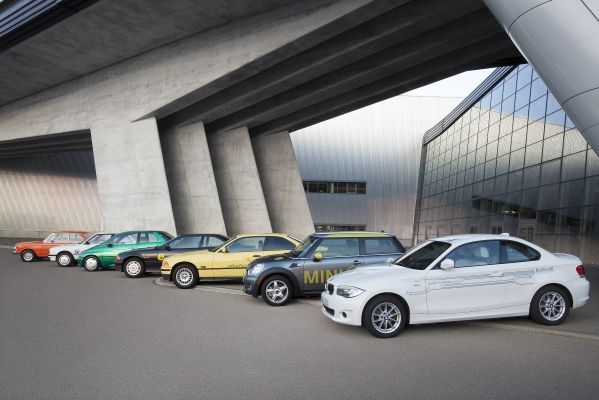In a recent press release from BMW, the automaker tells of the 40 years of development in electric mobility. Starting with the BMW 1602 and ending with the release of the BMW i3 in late 2013, BMW has launched a series of research and development project in order to bring an improved and more efficient technology to electric drive systems that it can deploy in mass produced vehicles.
When the first production version of the BMW i3 rolls off the assembly line in Leipzig in late 2013, it will mark the provisional culmination of 40 years of development work at BMW. It all began at the 1972 Olympic Games in Munich, where the BMW starting line-up included two electrically powered test vehicles. The converted BMW 1602 models served as a means of transport for the members of the organising committee, and were also deployed as support and camera cars in various long-distance events. However, there could be no questioning that lead batteries weighing 350 kilograms and with a range of around 60 kilometres (37 miles) were hardly ideal for a production car. BMW therefore launched a series of research and development projects with the aim of bringing an improved and, above all, more efficient technology for electric drive systems onto the road.
Here are some fun specifications of some of BMW’s electric vehicles over the years
| BMW 1602 Electric (1972): Specifications | |
| Motor |
DC shunt-wound motor (Bosch) |
| Continuous/peak output |
12 kW / 32 kW |
| Energy storage |
12 lead-acid starter batteries (Varta) |
| Capacity |
12.6 kWh |
| Weight |
350 kg |
| Performance (approx.) | |
| Top speed |
100 km/h (62 mph) |
| Acceleration 0-50 km/h (31 mph) |
8 sec |
| Range in city traffic |
30 km (19 miles) |
| BMW LS Electric (1975): Specifications | |
| Motor |
DC series motor (Bosch) |
| Continuous/peak output |
8 kW / 17 kW |
| Energy storage |
10 lead-acid traction batteries (Varta) |
| Capacity |
10.8 kWh |
| Weight |
318 kg |
| Performance (approx.) | |
| Top speed |
65 km/h (40 mph) |
| Acceleration 0-50 km/h (31 mph) |
11.4 sec |
| Range in city traffic |
30 km (19 miles) |
| BMW 325iX (1987-1990): Specifications | |
| Motor |
DC shunt-wound motor (ABB) |
| Continuous/peak output |
17 kW / 22 kW |
| Energy storage |
Sodium-sulphur high-energy battery |
| Capacity |
22 kWh |
| Weight |
265 kg |
| Performance (approx.) | |
| Top speed |
100 km/h (62 mph) |
| Acceleration 0-50 km/h (31 mph) |
9 sec |
| Range in city traffic |
150 km (93 miles) |
| BMW E1, 1st/2nd generation (1991-1993): Specifications | |
| Motor |
Permanently excited rotating-field |
| Continuous output |
32 kW |
| Energy storage |
Sodium-sulphur high-energy battery / |
| Capacity |
19.2 kWh / 19 kWh |
| Weight |
200 kg |
| Performance (approx.) | |
| Top speed |
120 km/h (75 mph) / |
| Acceleration 0-50 km/h (31 mph) |
6 sec / 5.6 sec |
| Range in city traffic |
150 km (93 miles) |
| BMW 325 / BMW electric (1992-1997): Specifications | |
| Motor |
Permanently excited rotating-field |
| Continuous output |
32 kW / 45 kW |
| Energy storage |
Sodium-nickel chloride high-energy battery |
| Capacity |
21.7 kWh / 29 kWh |
| Weight |
260 kg /350 kg |
| Performance (approx.) | |
| Top speed |
128 km/h (80 mph) / |
| Acceleration 0-50 km/h (31 mph) |
8 sec / 6 sec |
| Range in city traffic |
120 km (75 miles) / 150 km (93 miles) |
| MINI E (2008): Specifications | |
| Motor |
Asynchronous motor |
| Output |
150 kW |
| Energy storage |
Lithium-ion battery |
| Capacity |
35 kWh |
| Weight |
260 kg |
| Performance (approx.) | |
| Top speed |
152 km/h (94 mph) |
| Acceleration 0-100 km/h (62 mph) |
8.5 sec |
| Range |
250 km (155 miles) |
| BMW ActiveE (2010): Specifications | |
| Motor |
Permanently excited hybrid synchronous motor |
| Output |
125 kW |
| Energy storage |
Lithium-ion battery |
| Capacity |
32 kWh |
| Weight |
450 kg |
| Performance (approx.) | |
| Top speed |
145 km/h (90 mph) |
| Acceleration 0-100 km/h (62 mph) |
9 sec |
| Range in city traffic |
160 km (100 miles) |
Click here to read the full PDF report on BMW’s Electric Mobility Heritage
